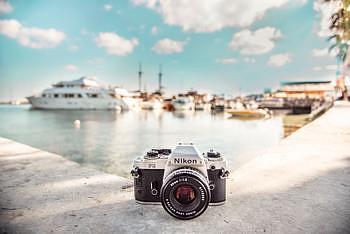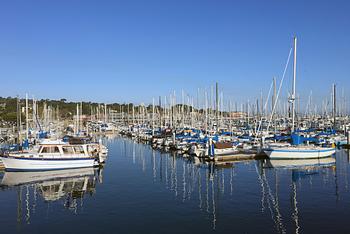If it’s time to sell your boat then the first step in the sales process is to figure out how much it’s worth. Setting a value for a used boat isn’t an exact science, and there are many factors that can affect it. One of the top questions we get asked at Rightboat is “What is my boat worth?” Our answer is always the same: there is a golden rule to pricing a boat—you can ask as much as you want, but it’s only worth what the current market supports.
Normally that figure will be based on what others have paid for similar yachts—and the best route to that information is usually through partnering with a professional yacht broker with experience selling your type of boat. But whether or not you work with a broker, this article will cover all the factors that go into pricing your boat.
The past few years have been a complex time for many markets including the marine market, with unprecedented demand for new and used boats following the COVID-19 lockdowns. The surge in purchases pushed boat prices sky high and has meant that there has been a lack of boats on the market with sellers able to charge far more than in previous years. Prices are now starting to settle but demand remains high. It’s worth taking this into account when researching competitive boat sales prices over the past few years.
Here we take a look at how you can value your boat when it’s ready for sale.

Setting a value for a used boat isn’t an exact science, and there are many factors that can affect it.
Pricing a Used Boat
Putting a price on your used boat can be tricky. It’s human nature (and common sense) to want to get the most for your asset, but finding the sweet spot that attracts buyers, makes it competitive on the used boat market, and gives you a satisfactory return isn’t always straightforward. Start the pricing process by following these steps;
Research the competition
Find what others have paid for similar boats, then some more homework and see what others are charging for the same model boat as yours. Be sure to compare everything from the condition and equipment list, to its location and how it was used (freshwater vs saltwater boats). As the market dictates the pricing, keep in mind that just because a boat is listed for a high price, doesn’t mean anyone will pay it.
Decide on your minimum price
While the market dictates the price, you do need to know the lowest figure you will accept. It might be governed by how much you need for a new boat or how much there is left on your marine mortgage.
Be open to offers
When deciding on the minimum price you’ll accept, factor in that buyers may want to make an offer. Adding “Or Best Offers” or “Offers in the Region of” is a good tactic to get more buyer interest when they will feel there may be some flexibility.
Boat Price Guides: JD Power (NADA Guides) and Kelley Blue Book
In the same way that there are valuation tools for cars, there are websites that offer used boat values. While not every model is listed in the boat value guides, and the value will depend hugely on the condition of your boat, it’s another source you can use to get the final asking price right. In the US, websites such as JD Power (previously NADA Guides) or Kelley Blue Book offer simple ways to look up your boat’s value:
- Browse by boat type: Select the type of boat, i.e. whether it’s a power boat, sailboat or personal watercraft
- Choose the make and model: Refine your search with make and model
- Enter your zip code: where you live will make a difference to you boat’s value
- Customize your search: You can then further refine your search by selecting everything from engine size to the type of canvas, fishing equipment, electronics, entertainment features, galley amenities, and more.
- Get your valuation: You will be presented with three boat value estimates; a suggested list price, a low retail price and an average retail price.
Pricing Vintage, Classic or Custom Boats
If boat pricing seems like a detailed process then just wait until we start talking about custom, vintage, and classic boats. These are notoriously difficult to price, and you can throw the JD Power and Kelley Blue Books out of the window. Don’t panic though, because there are procedures that can help you narrow down what your boat is worth, and you can also find specialist yacht brokers with expertise on pricing and proven ability buyers in this market sector.
The first hurdle in pricing a vintage, classic, or custom boat—whether you want to sell it or to buy it—is that there won’t be much to compare a unique boat against. To narrow it down, ask yourself the following questions;
- How rare is it? Find out how many were built and how many are still in operation today. The rarer the boat, the more value it has.
- What condition is it in? It goes without saying that the better the condition, the more it’s worth. If it’s been restored, be objective about how good the restoration project was. If it’s a wooden boat, does it need restoration? Is it seaworthy?
- What does it look like? The aesthetics of the boat will play a huge role in its price. Is it James Bond cool? Or a project boat that needs lots of TLC?
There are many places to look for guidance on pricing for your custom or vintage boat including;
- Vintage boat clubs and shows
- The Antique and Classic Boat Society
- The manufacturer (if they’re still in operation)
- Specialist brokers
- Specialist vintage or wooden boat restorers

The first hurdle in pricing a vintage, classic, or custom boat is that there won’t be much to compare a unique boat against.
Increasing a Used Boat’s Value
There are many things you can do to your boat to add value to it before you list it for sale. By putting in that extra effort now, not only might you get more money for your boat, but it will likely sell faster too. And imagine how appealing your boat will look on the sales photos and videos if it’s in tip top shape. Things you can consider doing include:
- Perform regular maintenance: This might seem obvious, but a regular, proven maintenance schedule is worth its weight in gold to prospective buyers as it provides reassurance and confidence in the boat’s condition. Stay on top of maintenance throughout your boat ownership, it’s easier and cheaper to maintain than to replace.
- Offer an impressive equipment list: A long equipment list is appealing to buyers and certainly adds value, so you might want to consider including (or investing in) items such as life jackets, flares, watersports gear or fishing equipment. Likewise, installing some new electronics will certainly give your boat a modern makeover. Media control centers, onboard WiFi, speakers or FishFinders are highly sought after.
- Upgrade the interior: Giving the interior a good spruce up can make a huge difference to your boat’s value. You could upgrade the fabrics and saloon cushions, update the portholes or windows, or replace interior vinyl or carpets. And don’t forget the galley, some new décor, and gadgets can give your boat a major facelift. For more advice check out our guide on Boat Interior Restoration Tips.
- Set the stage: In the same way that house sellers stage their homes for sale, you can do the same with your boat. Clear out all of your personal possessions and get your boat looking catalog-ready by adding a few strategically placed home comforts and décor pieces.
For more ideas check out our guide to 8 Ways to Increase the Value of Your Boat
What Factors Affect the Price of a Boat?
- Boat brand and model: Certain brands and specific models will be valued higher than some similar models. Generally, well-known brands or award-winning models that are highly sought after and have a good reliability record will have a higher price tag.
- Age and Engine Hours: As with used cars, the age of a boat will affect its price. It makes sense that the older a boat, the lower the price tag (unless it’s a classic). Having said that, however, an older boat that hasn’t been used much and whose engine has fewer hours on the clock (but maintained well) could be worth more than a newer boat of the same model that’s been heavily used. Keep in mind, though, that an older boat that has been unused might not have been well maintained.
- Condition: As we’ve seen above, the condition of your boat makes a big impact on the value. Keeping a strict maintenance schedule, doing regular repairs, and taking care of the interior will go a long way to ensuring your boat is at the top end of its valuation bracket.
- Equipment: A long list of good quality and relatively new equipment certainly adds value to your boat (often more value than the equipment is worth new).

The condition of your boat makes a big impact on the value.
Common Mistakes When Pricing a Used Boat
When pricing your boat it can be difficult to stay objective and see it with unbiased eyes. As a result you may end up pricing your boat incorrectly for several reasons. Some of the most common mistakes we see when people are pricing their boats include:
- Pricing it too high: Quite simply, the No. 1 mistake people make when pricing their boat is pricing it too high. Trying to get more for your boat than the market is willing to pay will end up in frustration and wasted time.
- Putting too many emotions into the decision: Sometimes owners put so much time, money, and passion into their boat that they value it much higher than the market does. Try to remain objective and unemotional about your pricing.
- Not being realistic about the boat’s condition: Again it’s easy to see your boat through rose-tinted glasses and overlook some of the areas of your boat that might need attention. Comparing the same model in a better condition than yours and giving it the same price tag won’t generate lots of interest.
Researching Used Boat Values for Buyers
In this article, we’ve focused on correctly pricing a used boat from the point of view of the seller. But it’s important as a buyer to also do the same research so you can know that you’re not paying too much for your next boat. You, as buyer, are the driving force behind the boat-selling market and ultimately dictate what used boats will sell for. If no one will buy a boat at a certain price point, then it isn’t worth that much. Having said that, it’s vital that you know what a reasonable price is for the type and age boat you’re looking to buy. When you’re starting out your boat-buying journey, here are five tips:
- Do your research: Start looking at used boats on boat-selling marketplaces such as Rightboat to get a feel for how much the type of boat you want is selling for. Once you’ve started to narrow your search down to specific boats, use websites such as JD Power (previously NADA Guides) or Kelley Blue Book to see prices based on precise specifications, make, model, age, condition, and any customization.
- Compare boats that are truly similar: Be sure to stay objective when comparing different boats, and that you’re truly comparing similar boats. When comparing boats of exactly the same make, model, and age, look at the condition, maintenance record, how many hours the engine has on it, and the equipment on board to truly compare. One boat might seem like a bargain, but it could cost you far more to get it to the same condition as a similar boat in far better condition that is priced slightly higher. In short, don’t just look at the price tag. See what you’re getting for your money.
- Don’t be swayed by equipment and extras: While we’ve said to look at the equipment list, it’s important not to get dazzled by an impressive list of extras. It’s a common sales technique to offer electronics, soft furnishings, safety gear, and more but in fact it’s the integrity of the boat where you need to maintain focus.
- Hire a surveyor to appraise a boat before buying it: Unless you’re buying a particularly small boat, it’s a good idea to find a professional surveyor to come and inspect the boat. They will be able to give you an unbiased report on the hull and general condition of the boat, the rig if it’s a sailboat, and the engine. Armed with this report you’ll be able to make a better assessment on the price being asked for the boat, and be in a stronger position to negotiate.
- Find a boat dealer you can trust: If you’re going to buy through a dealer or broker then find one you can trust, who comes with good reviews or recommendations. There are many passionate and reputable brokers and dealers out there who will work hard to ensure that they get the best price for their client and a good commission for themselves, but without ripping off their customers.
For more help on becoming a boat owner, check out our Guide to Buying a Boat for all the answers.

Be sure to stay objective when comparing different boats, and that you’re truly comparing similar boats.
Used Boat Pricing for Insurance or Boat Loans
Another reason that you might want to get your boat valued is for insurance purposes or when getting a boat loan. It’s common for insurance providers and lenders to ask for a valuation to be included so that they can accurately cover your boat in case of accident or damage, and for lenders to know what the asset is worth.
How to Sell Your Boat
Once you’ve answered the question ‘how much is my boat worth?’ you can move on to the next step in the process of selling your boat. Check out our comprehensive and step by step Guide to Selling Your Boat for all the answers.
This article was published in September 2023 and updated in December 2023.
Related Articles and Guides
5th Dec 2023
9 Ways on How to Increase the Value of Your Boat
4th Dec 2023
How to Take Photos and Videos that Will Sell your Boat
3rd Dec 2023
How to Prepare My Boat for Sale
1st Dec 2023






